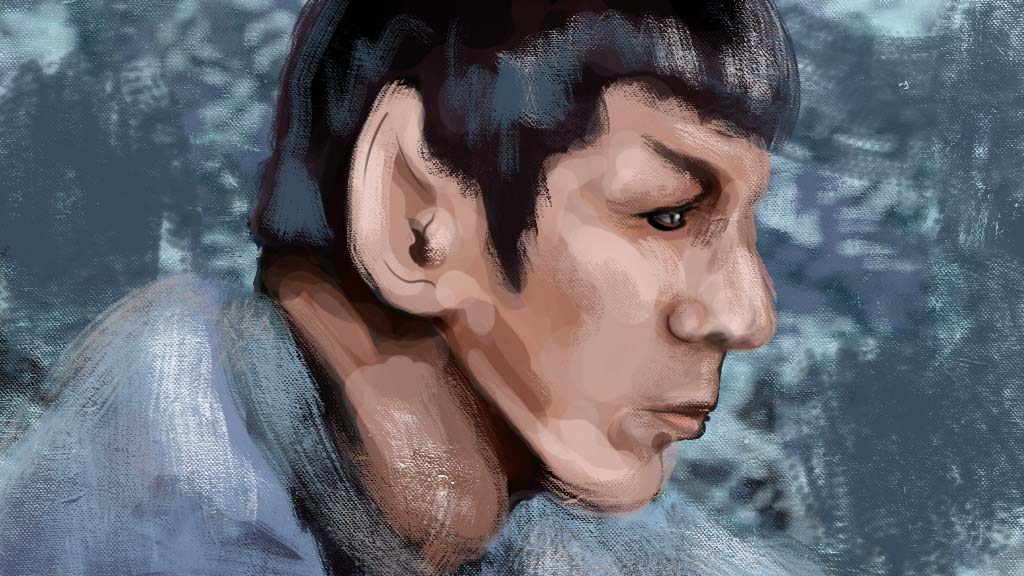Leonard Nimoy: Off on an Intergalactic Voyage at Last
by Dev Sheth | published Mar. 18th, 2015
Leonard Nimoy, the fascinating artist behind the iconic Vulcan character of Spock from the "Star Trek" series, passed away on Friday, Feb. 27, 2015 in his home in Los Angeles at the age of 83. The cause of death has been confirmed to be chronic obstructive pulmonary disease, the result of a smoking habit that Nimoy gave up over three decades ago.
Nimoy played the role of Spock from the pilot of the "Star Trek" original series through to 1969, followed by 8 movies of the "Star Trek" franchise. The character became synonymous with his life, so much so that his autobiographies, “I Am Not Spock” and “I Am Spock” were written with a focus on sharing his life with the character. He directed the third and fourth "Star Trek" movies as well as the 1987 hit “Three Men and a Baby,” among others.
He was a man of many talents, with an interest in fields other than cinematography, such as photography, poetry and music. He studied photography at the University of California, Los Angeles (UCLA) in the 1970s. Some of his photographs were published, as well as several of his poems. A compilation of his work, "A Lifetime of Love: Poems on the Passage of Life," was published in 2002. His interest in music resulted in five albums of vocal recordings, the first two as Spock, the final three albums including covers of popular songs alongside some of his own. He was also heavily involved in voice-overs, including the "Star Trek" animated series, had a wildly popular guest appearance on The Big Bang Theory and appeared in the recently televised movie “The Miracle of Israel.”
The character of Spock is perhaps Nimoy’s greatest claim to fame. He is an icon for fans of science fiction across all ages. His friendship with "Star Trek" co-star William Shatner, who played the role of Captain Kirk, mirrored their on-screen relationship. The two titular characters of the series were markedly different in personality, with Kirk portrayed as the tough, hotheaded, charismatic leader of the group and Spock as the highly rational, calculating and sometimes abrasive evangelist of logic. The dynamics of the show built a premise for the proverbial "cool kids" and the "geeks" to connect, to share an experience that taught acceptance and understanding of opposing personalities as much as it reinforced the cordiality of a multi-racial, multi-cultural universe.
Spock transcended boundaries of franchise and became a reference point for all subsequent interpretations of the slightly weird, shy and intellectual child in not just sci-fi, but in all pop culture. The impact of Nimoy’s death on members of the film and television industry is testimony to the fact that Spock affected lives outside of "Star Trek" in ways that few characters ever do. From Zachary Quinto, the actor who reprised the role of Spock in the recent "Star Trek" movies, to President Barack Obama, the tributes that have been flowing in all point to the fact that Nimoy’s life and his interpretation of Spock, which carried more of him than anyone would ever know, followed the Vulcan’s universally famous greeting: he did indeed live long and prospered.
Twitter tributes to Leonard Nimoy:
"Long before being nerdy was cool, there was Leonard Nimoy." —President Obama #RIPLeonardNimoy #LLAP pic.twitter.com/sX6yvK5eLA
— The White House (@WhiteHouse) February 27, 2015
"I loved him like a brother. We will all miss his humor, his talent and his capacity to love." -William Shatner http://t.co/U8ZN98tVYp
— William Shatner (@WilliamShatner) February 27, 2015
Goodbye, Leonard. You will be greatly missed. #LLAP pic.twitter.com/AcdglYh2by
— The Simpsons (@TheSimpsons) February 27, 2015
RIP Leonard Nimoy. So many of us at NASA were inspired by Star Trek. Boldly go... http://t.co/qpeH5BTzQc
— NASA (@NASA) February 27, 2015




